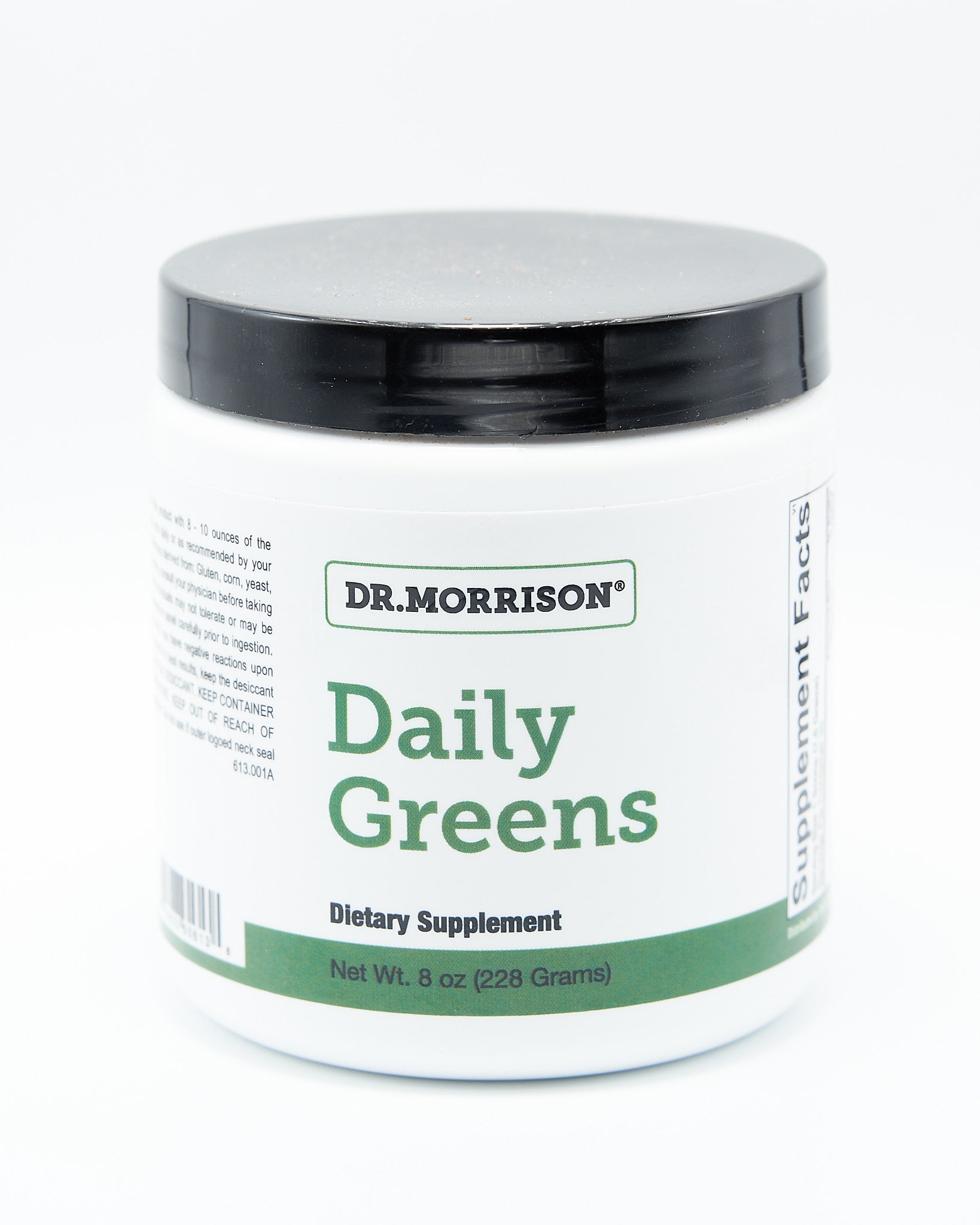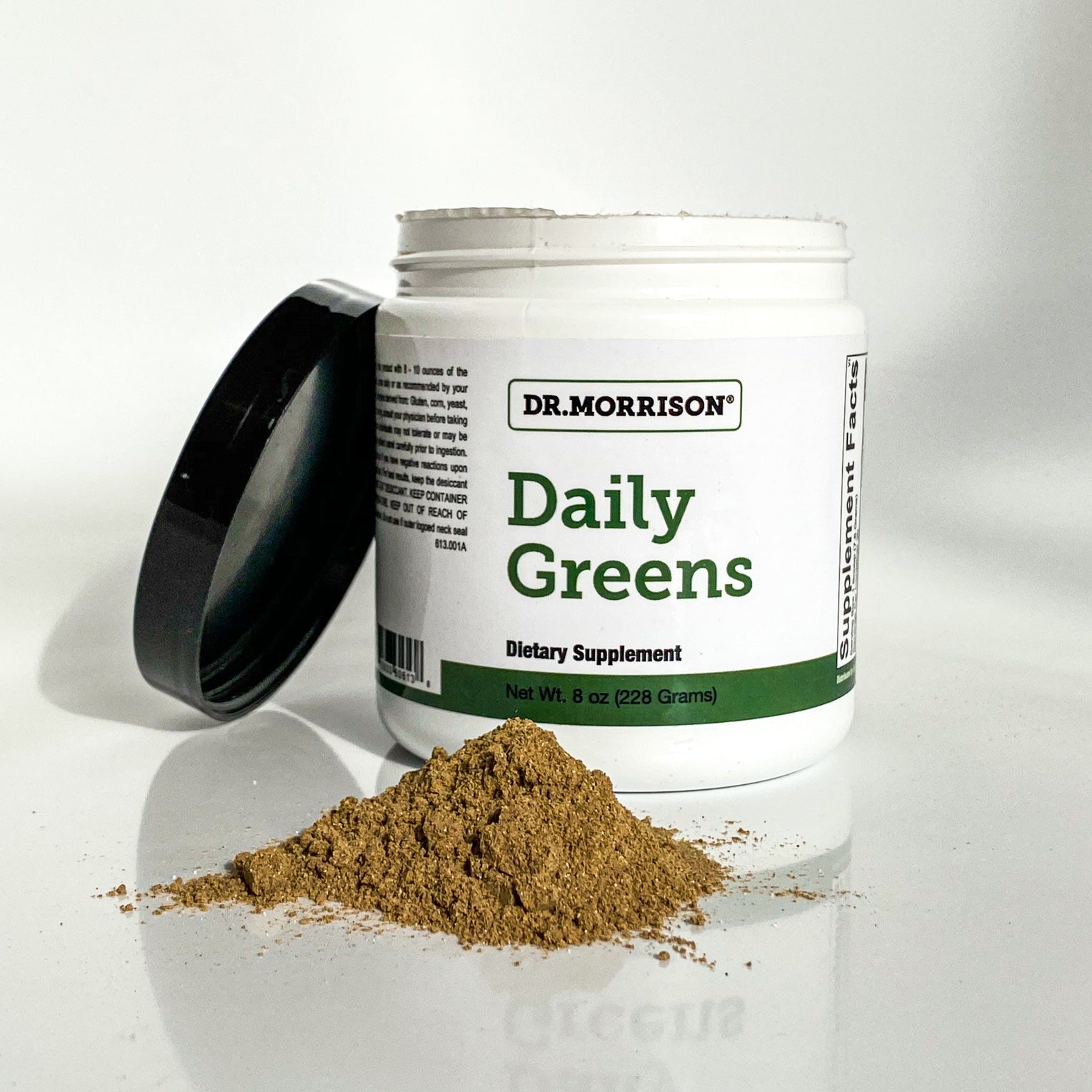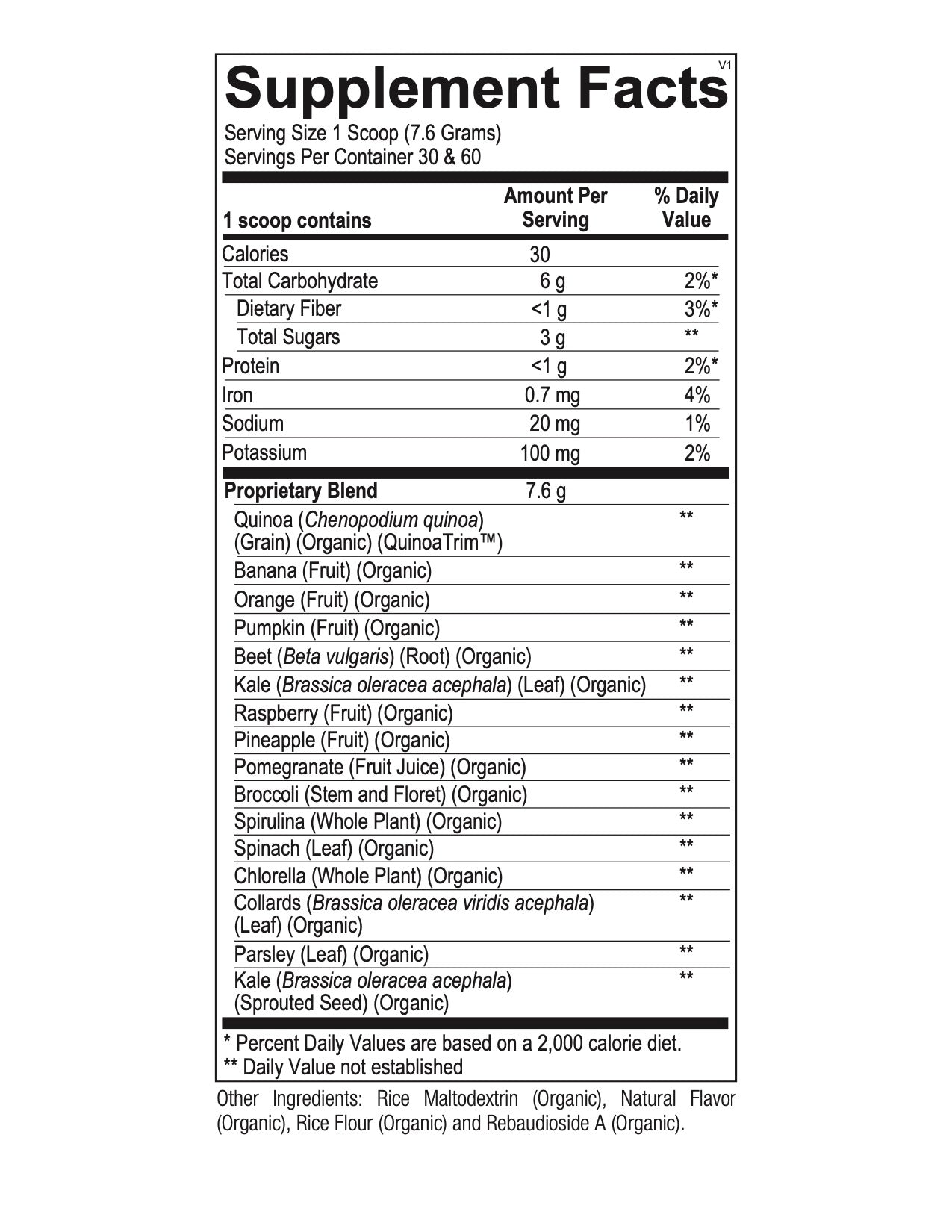Daily Greens
$ 68.00
Size: 8 oz (228 g)
Concentrated Organic Superfood Powders for Complete Nutrition and Antioxidant Support
Daily Greens Powder is a great-tasting, convenient powder that provides beneficial nutrients from berries, fruits, vegetables, and greens to support balanced nutrition. The formula combines 16 concentrated organic superfoods to help build antioxidant reserves to protect the body from free radical damage and promote overall wellness.*
Product Highlights:
- Provides Full-Spectrum Superfoods*
- Contains Concentrated Organic Berries, Vegetables, and Greens*
- Supports Healthy Antioxidant Levels*
The USDA’s “MyPlate” recommends that adults load up 50% of their dinner plate with fruits and vegetables. While most of us know that fruits and vegetables are packed with nutrients, antioxidants, and polyphenols that have a positive impact on our health, nearly 90% of Americans are not consuming the recommended amount.1 It can be difficult to incorporate diverse fruits and vegetables into our daily diets for many reasons—the shelf life of produce is short, preparation can be time-consuming, and many of us stick with our limited, familiar foods.
Daily Greens provides a blend of organic fruits and greens paired with a wide variety of organic vegetable powders to help you bridge the gap. Beets, pumpkin, pomegranate and greens like spirulina and chlorella are just a few of the superfoods in this unique blend. Daily Greens can be mixed in juice or water, or used to give an added boost of phytonutrients to your morning smoothie. Both children and adults love Dr. Morrison’s Daily Greens!
*These statements have not been evaluated by the FDA and are not intended to treat or cure any disease.
FODMAP-Friendly
Short-chain carbohydrates called FODMAPs (Fermentable Oligosaccharides, Disaccharides, Monosaccharides And Polyols) can cause uncomfortable gas and bloating in some individuals. Following a low-FODMAP diet can help, but FODMAPs are found in numerous fruits and vegetables which can make it difficult to eat a well-rounded diet. Each fruit, vegetable, and green in Daily Greens is low FODMAP, for complete nutritional support.
Certified Organic
Organically-grown fruits and vegetables have been found to have higher levels of beneficial antioxidants, polyphenols, and other nutrients than their conventionally grown counterparts. In addition, organic produce avoids the use of toxic pesticides. Daily Greens uses all certified organic fruits and vegetables.
Clean and Pure
Daily Greens has no added sugar, yeast, or artificial colors and flavors, and is completely gluten free!
1 SCOOP (7.6 g) PER SERVING
Iron 0.7 mg
Sodium 20 mg
Potassium 100 mg
Proprietary Blend of (7.6 g per serving): Organic Chenopodium quinoa, Organic Banana, Organic Orange, Organic Pumpkin, Organic Beet, Organic Kale, Organic Raspberry, Organic Pineapple, Organic Pomegranate, Organic Broccoli, Organic Spirulina, Organic Spinach, Organic Chlorella, Organic Collards, Organic Parsley and Organic Sprouted Kale Seed.
Mix 1 scoop with 8 - 10 ounces of the beverage of your choice to the desired thickness, once daily or as recommended by your health care professional.
Adults Meeting Fruit and Vegetable Intake Recommendations - United States, 2019
The 2020-2025 Dietary Guidelines for Americans* advise incorporating more fruits and vegetables into U.S. residents' diets as part of healthy dietary patterns. Adults should consume 1.5-2 cup-equivalents of fruits and 2-3 cup-equivalents of vegetables daily.† A healthy diet supports healthy immune function (1) and helps to prevent obesity, type 2 diabetes, cardiovascular diseases, and some cancers (2); having some of these conditions can predispose persons to more severe illness and death from COVID-19 (3). CDC used the most recent 2019 Behavioral Risk Factor Surveillance system (BRFSS) data to estimate the percentage of states' adult population who met intake recommendations overall and by sociodemographic characteristics for 49 states and the District of Columbia (DC). Overall, 12.3% of adults met fruit recommendations, ranging from 8.4% in West Virginia to 16.1% in Connecticut, and 10.0% met vegetable recommendations, ranging from 5.6% in Kentucky to 16.0% in Vermont. The prevalence of meeting fruit intake recommendations was highest among Hispanic adults (16.4%) and lowest among males (10.1%); meeting vegetable intake recommendations was highest among adults aged ≥51 years (12.5%) and lowest among those living below or close to the poverty level (income to poverty ratio [IPR] <1.25) (6.8%). Additional policies§ and programs that will increase access to fruits and vegetables in places where U.S. residents live, learn, work, and play, might increase consumption and improve health.
Fruit and Vegetable Intake and Mental Health in Adults: A Systematic Review
The role of a properly balanced diet in the prevention and treatment of mental disorders has been suggested, while vegetables and fruits have a high content of nutrients that may be of importance in the case of depressive disorders. The aim of the study was to conduct a systematic review of the observational studies analyzing association between fruit and vegetable intake and mental health in adults. The search adhered to the guidelines of Preferred Reporting Items for Systematic Reviews and Meta-Analyses (PRISMA), and the review was registered in the International Prospective Register of Systematic Reviews (PROSPERO) database (CRD42019138148). A search for peer-reviewed observational studies published until June 2019 was performed in PubMed and Web of Science databases, followed by an additional manual search for publications conducted via analyzing the references of the found studies. With respect to the intake of fruit and/or vegetable, studies that assessed the intake of fruits and/or vegetables, or their processed products (e.g., juices), as a measure expressed in grams or as the number of portions were included. Those studies that assessed the general dietary patterns were not included in the present analysis. With respect to mental health, studies that assessed all the aspects of mental health in both healthy participants and subjects with physical health problems were included, but those conducted in groups of patients with intellectual disabilities, dementia, and eating disorders were excluded. To assess bias, the Newcastle-Ottawa Scale (NOS) was applied. A total of 5911 studies were independently extracted by 2 researchers and verified if they met the inclusion criteria using a 2-stage procedure (based on the title, based on the abstract). After reviewing the full text, a total of 61 studies were selected. A narrative synthesis of the findings from the included studies was performed, which was structured around the type of outcome. The studies included mainly focused on depression and depressive symptoms, but also other characteristics ranging from general and mental well-being, quality of life, sleep quality, life satisfaction, flourishing, mood, self-efficacy, curiosity, creativity, optimism, self-esteem, stress, nervousness, or happiness, to anxiety, minor psychiatric disorders, distress, or attempted suicide, were analyzed. The most prominent results indicated that high total intake of fruits and vegetables, and some of their specific subgroups including berries, citrus, and green leafy vegetables, may promote higher levels of optimism and self-efficacy, as well as reduce the level of psychological distress, ambiguity, and cancer fatalism, and protect against depressive symptoms. However, it must be indicated that the studies included were conducted using various methodologies and in different populations, so their results were not always sufficiently comparable, which is a limitation. Taken together, it can be concluded that fruits and/or vegetables, and some of their specific subgroups, as well as processed fruits and vegetables, seems to have a positive influence on mental health, as stated in the vast majority of the included studies. Therefore, the general recommendation to consume at least 5 portions of fruit and vegetables a day may be beneficial also for mental health.




